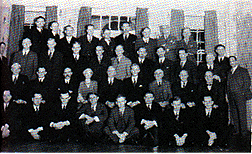 |  |  |  |
Women's Intellectual Contributions to the Study of Mind and SocietyPSYC/ANS0 4900 01
Instructor: Dr. Linda M. WoolfOffice Hours:
|
Texts:
- Scarborough, E., & Furumoto, L. (1987). Untold lives: The first generation of
American women psychologists. New York: Columbia University Press.
- Kite, M. E., Russo, N. F., & Brehm, S. S. (2001). Women psychologists in academe: Mixed progress, unwarranted complacency. American Psychologist, 56, 1080-1098.
Course Description:
Women such as Christine Ladd-Franklin, Mary Cawkins, and Mamie Clark have traditionally been omitted from the histories of their disciplines. This course is designed to re-place women into the history of psychology, sociology, anthropology, and social work. We will examine the lives of these women, their intellectual contributions, and the unique impact and special problems that being female had on their careers. As this course is a seminar, active student particiption in presentation and discussion of material is expected.
This course will highlight the fact that statements such as these failed to deter ALL women:

Society of Experimental Psychology - Women were not admitted until after the death of the Society's founder, E. B. Titchener, in 1929. Can you find Margaret Floy Washburn?
Specific Course Objectives & Outcomes:
- Objective: To become familiar with the major women (primarily from the past but we can also include current scholars) who have personally and professionally significantly impacted the fields of anthropology, psychology, social work, and sociology.
- Objectives: To become familiar with the work of these women scholars.
- Objectives: To develop an understanding of the special problems that women have experienced as they developed their careers within the tradition of academic science.
- Objectives: To further develop library, cybrary and other research skills.
Senior Seminar Course Learning Goals and outcomes
- Learning Goal: Students will examine a topic in-depth from multiple theoretical perspectives.
- Learning Goal: Students will understand and apply principles from the course to personal, social, and/or organizational issues.
- Learning Goal: Students will actively participate in their learning and communicate effectively in a variety of formats.
 Electric Kitchen Mixer |  Refridgeratror Door Shelves |  Step-On Trash Can |
Incoming Competencies/Prerequisites:
12 credit hours of social science or permission of the instructor. All students should be capable of integrating and evaluating information, critical thinking, and writing at the college level.
Class Meetings:
The class will meet on Thursdays from 5:30 - 9:30. As this is a seminar class, classroom attendance is mandatory. Class participation and discussion will greatly enhance your understanding of the material. Additionally, you and your fellow classmates are interdependent in a seminar course. A high level of commitment is necessary from everyone to guarantee optimal learning and benefit. As such, participation/discussion will constitute a large percentage of your final grade.
Course Requirements:
- One major paper with bibliography discussing the life and work of a significant women contributor to one of the fields associated with the study of mind and society. The paper should provide a discussion of the woman's early life, education, and career (approximately 20% of the paper); a discussion of any special impact be female had on the women's career (approximately 10% of the paper); and a review of her primary areas of work and research (approximately 70% of the paper). Each paper should include an appropriate bibliography and be in APA format. Each paper should be paper is to be approximately 12-18 pages (approximately 4,500 to 7,000 words). A minimum 30 minute presentation to class to accompany the paper. 30%
- Two short papers with bibliography and short presentations each discussing the life and work of two significant women contributors to the fields associated with the study of mind and society. See the instructions above for these shorter papers however the length should be 5 - 7 pages (approximately 1,500 to 2500 words). A shorter presentation (15 - 20 minutes) will also accompany these papers. 30%
- A personal reaction paper discussing the problems women have traditionally encountered in anthropology, psychology, social work, or sociology; and how this may or may not impact your career (Final essay question). Due the final week of class. 15%
- Final Exam. 15%
- Class participation and discussion. 10%
All papers must be submitted electronically in Word format to woolflm@webster.edu.
All grades will be assigned on a scale of 0 - 10 with:
| 90 - 100 | A-,A | Excellent |
| 80 - 89 | B-,B,B+ | Above Average |
| 70 - 79 | C-,C,C+ | Average |
| 60 - 69 | D-,D,D+ | Below Average |
| Less than 60 | F | Failing |
Class Participation & Discussion: Please realize that your participation in this class is extremely important. As such, class participation will constitute 15 percent of your final grade. The class participation grade will derive from regular attendance and everyday discussion and analysis. Please be aware that missing class (either excused or unexcused absences) as well as arriving late or leaving early will impact your grade in this area.
Policy Statements:
Use of Electronic Devices in the Classroom: Please respect others in the class by turning off all cell phones and pagers before entering the room. Text messaging during class is not acceptable. Laptops may be used in class but are only to be utilized for class related activities (e.g., taking notes). If it becomes apparent you are using the computer for non-class activities (e.g., checking your email, playing games) then you may be asked to turn off your computer and refrain from bringing it into class in the future. Laptop use is restricted to the back or sides of the classroom so that other students are not distracted during lecture.Plagiarism (attempting to pass off the work of another as one's own) is not acceptable. Plagiarism includes copying all or part of another's writings (even a single sentence), inappropriate paraphrasing, using another student's paper as your own, submitting a paper for more than one class. All papers will be submitted to the university's plagiarism database for review. Plagiarism, either intentional or unintentional, will result in a grade of 0 for that assignment and will be turned over to the appropriate university source for disciplinary action. In addition, cheating on exams will also result in the same fate.
Here are some Web sites that will help you avoid the problem of plagiarism particularly plagiarism resulting from paraphrasing too closely to the original source. -
- Establishing Authorship by Paul C. Smith, Alverno College
- How to Avoid Plagiarism Tutorial
- The University of Indiana's Online Plagiarism Tutorial - You can print out a certificate of completion!
Late withdraws from this class will not be approved by the instructor except in cases of emergency discussed with the instructor. No late withdraws will be approved on the basis of poor class performance.
This syllabus is subject to change at the instructor's discretion. All changes concerning course requirements will be provided in writing. Changes concerning exam dates may be made at the instructor's discretion and communicated verbally to the class.
It is understood that remaining in this course (not dropping or withdrawing from this course) constitutes an agreement to abide by the terms outlined in this syllabus and an acceptance of the requirements outlined in this document. No grade of Incomplete will be issued for this course.
The schedule below provides a general guideline to the semester and will be revised based on class discussion/decisions during the first three weeks of class.
Course Schedule | |||
Week | Topic | ||
| January | 15 | Introduction to class Who were/are these women? Why were they excluded?
Readings:
| |
| January | 23 | Why were these women excluded?
Readings:
| |
| January | 29 | Student Presentations | |
| February | 5 | Student Presentations Small Biography One due | |
| February | 12 | Student Presentations | |
| February | 19 | Student Presentations Small Biography Two due | |
| February | TBA | Student Presentations | |
| March | 5 | Student Presentations Major Biography One due Final wrap-up and discussion Personal Reaction Paper due - March 6 | |
 |  Woolf Home Page Woolf Home Page |